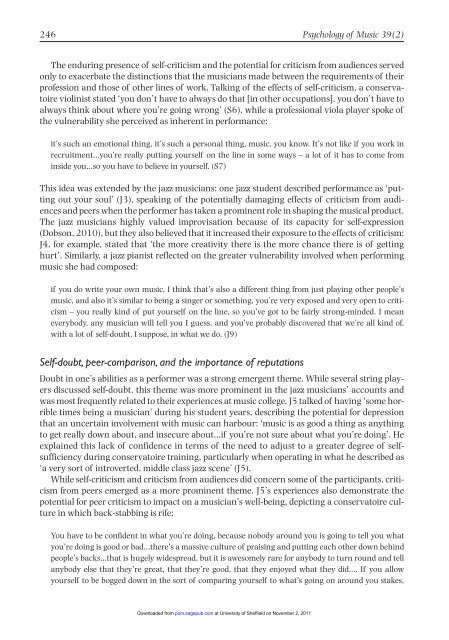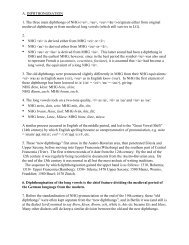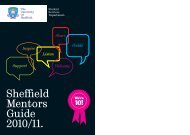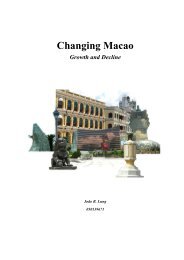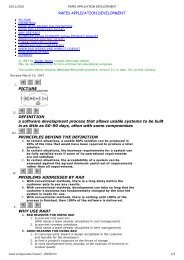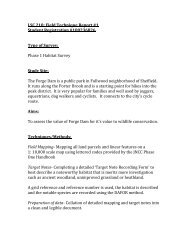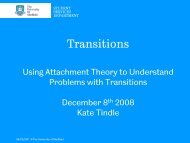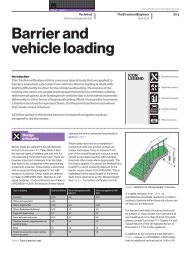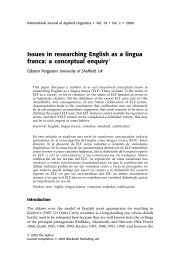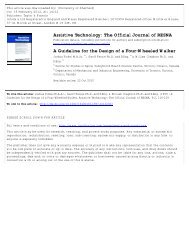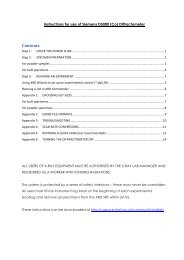Dobson, 2010.pdf - University of Sheffield
Dobson, 2010.pdf - University of Sheffield
Dobson, 2010.pdf - University of Sheffield
You also want an ePaper? Increase the reach of your titles
YUMPU automatically turns print PDFs into web optimized ePapers that Google loves.
246 Psychology <strong>of</strong> Music 39(2)<br />
The enduring presence <strong>of</strong> self-criticism and the potential for criticism from audiences served<br />
only to exacerbate the distinctions that the musicians made between the requirements <strong>of</strong> their<br />
pr<strong>of</strong>ession and those <strong>of</strong> other lines <strong>of</strong> work. Talking <strong>of</strong> the effects <strong>of</strong> self-criticism, a conservatoire<br />
violinist stated ‘you don’t have to always do that [in other occupations], you don’t have to<br />
always think about where you’re going wrong’ (S6), while a pr<strong>of</strong>essional viola player spoke <strong>of</strong><br />
the vulnerability she perceived as inherent in performance:<br />
it’s such an emotional thing, it’s such a personal thing, music, you know. It’s not like if you work in<br />
recruitment…you’re really putting yourself on the line in some ways – a lot <strong>of</strong> it has to come from<br />
inside you…so you have to believe in yourself. (S7)<br />
This idea was extended by the jazz musicians: one jazz student described performance as ‘putting<br />
out your soul’ (J3), speaking <strong>of</strong> the potentially damaging effects <strong>of</strong> criticism from audiences<br />
and peers when the performer has taken a prominent role in shaping the musical product.<br />
The jazz musicians highly valued improvisation because <strong>of</strong> its capacity for self-expression<br />
(<strong>Dobson</strong>, 2010), but they also believed that it increased their exposure to the effects <strong>of</strong> criticism:<br />
J4, for example, stated that ‘the more creativity there is the more chance there is <strong>of</strong> getting<br />
hurt’. Similarly, a jazz pianist reflected on the greater vulnerability involved when performing<br />
music she had composed:<br />
if you do write your own music, I think that’s also a different thing from just playing other people’s<br />
music, and also it’s similar to being a singer or something, you’re very exposed and very open to criticism<br />
– you really kind <strong>of</strong> put yourself on the line, so you’ve got to be fairly strong-minded. I mean<br />
everybody, any musician will tell you I guess, and you’ve probably discovered that we’re all kind <strong>of</strong>,<br />
with a lot <strong>of</strong> self-doubt, I suppose, in what we do. (J9)<br />
Self-doubt, peer-comparison, and the importance <strong>of</strong> reputations<br />
Doubt in one’s abilities as a performer was a strong emergent theme. While several string players<br />
discussed self-doubt, this theme was more prominent in the jazz musicians’ accounts and<br />
was most frequently related to their experiences at music college. J5 talked <strong>of</strong> having ‘some horrible<br />
times being a musician’ during his student years, describing the potential for depression<br />
that an uncertain involvement with music can harbour: ‘music is as good a thing as anything<br />
to get really down about, and insecure about…if you’re not sure about what you’re doing’. He<br />
explained this lack <strong>of</strong> confidence in terms <strong>of</strong> the need to adjust to a greater degree <strong>of</strong> selfsufficiency<br />
during conservatoire training, particularly when operating in what he described as<br />
‘a very sort <strong>of</strong> introverted, middle class jazz scene’ (J5).<br />
While self-criticism and criticism from audiences did concern some <strong>of</strong> the participants, criticism<br />
from peers emerged as a more prominent theme. J5’s experiences also demonstrate the<br />
potential for peer criticism to impact on a musician’s well-being, depicting a conservatoire culture<br />
in which back-stabbing is rife:<br />
You have to be confident in what you’re doing, because nobody around you is going to tell you what<br />
you’re doing is good or bad…there’s a massive culture <strong>of</strong> praising and putting each other down behind<br />
people’s backs…that is hugely widespread, but it is awesomely rare for anybody to turn round and tell<br />
anybody else that they’re great, that they’re good, that they enjoyed what they did.... If you allow<br />
yourself to be bogged down in the sort <strong>of</strong> comparing yourself to what’s going on around you stakes,<br />
Downloaded from<br />
pom.sagepub.com at <strong>University</strong> <strong>of</strong> <strong>Sheffield</strong> on November 2, 2011


